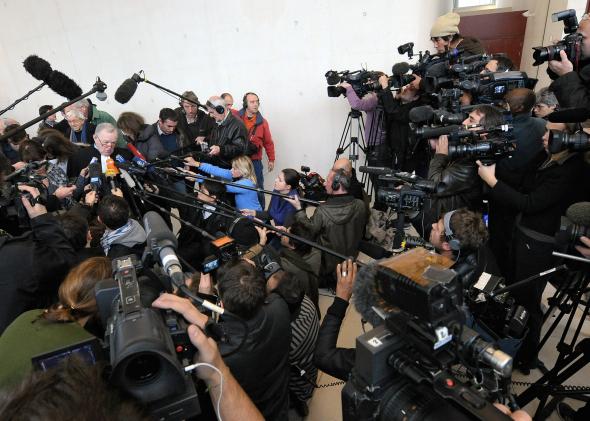Media Ignorance: Not My Problem

Photo by Franck Fife/AFP/Getty Images
Mollie Hemingway is one of the great conservative shamers of liberal media ignorance, a beat that was very useful and funny in her time at GetReligion—a beat that will never get boring. When I woke up this morning, I found about her latest piece via conservatives chortling at this pull quote about Huffington Post reporter Zach Carter's trainwreck interview with Hugh Hewitt.
It’s such a display of ignorance that it seems almost unfair. But looked at another way, it’s simply a good interview where Hewitt seeks to establish Carter’s background and breadth of knowledge in order to help listeners know on what basis he critiqued Cheney.
My favorite line was when Carter was asked if he’d heard of George Weigel and he replied, “I’ve heard of Dave Weigel.”
Now, more people should be aware of the neoconservative Catholic writer/John Paul II biographer George Weigel (no relation), but I have to take exception to my cameo in this article about "media ignorance." Hemingway scoffs at the media panic over David Brat, the economics professor who conquered Rep. Eric Cantor in this June's primary: Political reporters "could reasonably be expected to have passing familiarity with German sociologist Max Weber."
I agree. That's one reason why I wrote a short post a few weeks ago about Brat's economics and the influence of Max Weber.
At another point, Hemingway mocks a New York Times reporter for discovering that the Tea Party was consulting "once-obscure texts by dead writers" like Friedrich Hayek. That's very mockable, and it's even funnier to think that the readers of the Times* had (in 2010!) to have Hayek explained to them. But some of us know who Hayek is, and didn't need decoder rings when we covered the Tea Party in 2009 and 2010 and heard people fretting about a "road to serfdom."
My narrow point here is that I didn't like being a totem of media ignorance in a piece that mentions some things I covered closely. Hemingway's larger point is worth taking. Every time you, the reader, see the mainstream media get something wrong—every time they run with a fake chart, or botch the description of a gun, or misstate the year of an election—you naturally wonder if they get anything right. It's even more irritating when one of the new sites that aims to explain the news, a designation that takes for granted that the rest of the media sometimes blows it, blows it itself.
The rewards of writing a piece that gets something wrong, or overhypes it out of ignorance, are similar to the rewards of writing an actual fake news piece—lots of tweets and Facebook shares, and lots of readers. Ask anyone who's written a reported book about the Obamas what they think of the sales for Ed Klein's fan fiction. The reader has gained a kind of independence unthinkable in the days before he/she could read any newspaper article online, or stream any video during or after an event. Reporters can use that independence, too! I think about this all the time, which is why it was surprising to be cited in an article about how the media blows it.
*Speaking of, it's amazing to me that so few liberals knew who the Kochs were until Jane Mayer's 2010 New Yorker story. Tom Frank's What's the Matter With Kansas?, a hit that jumped onto countless liberal bookshelves in 2005, goes into some detail about the Kansas-born Charles Koch.
